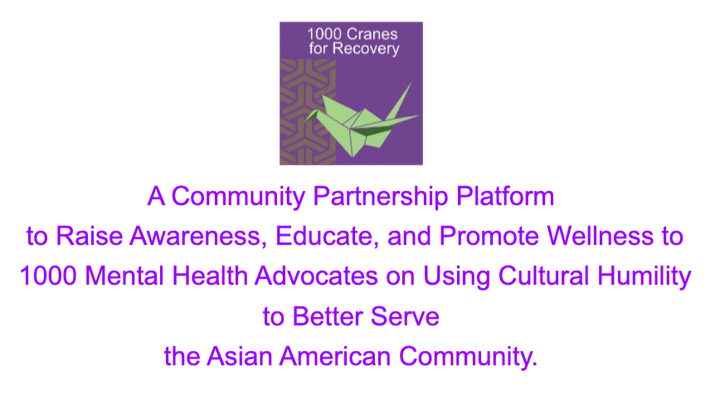
1000 Cranes for Recovery
Donation protected
 1000 CRANES FOR RECOVERY
1000 CRANES FOR RECOVERYAs a Japanese-American daughter of post-WWII immigrant parents, I often frequented the stereotyped, hard-working, successful, and eager to blend into the upper-middle class American society. However, this “Model Minority Myth” only exacerbated my tendencies to not seek help even in the face of a mental health crisis.
I founded 1000 Cranes for Recovery because it emphasizes on the importance of unity among peers and their community for recovery. The 1000 cranes or "Senbatsuru " is an old Japanese tradition where community members unite to fold a thousand beautiful origami cranes to wish for someone’s recovery. Today’s stressful environment emphasizes recovery as “Pulling yourself up by your bootstraps”. Although, 1000 Cranes for Recovery believes a peer-run community doing something together meaningful can be a powerful source of recovery. We see an API peer community sharing cultural humility as the missing puzzle piece of the underlying problem that often drugs cannot heal.
The 1000 Cranes for Recovery advocates peer-run communities by focusing on a holistic recovery model, I call the Three Care Pillars : Raising Awareness, Educating, and Wellness Activities utilizing cultural humility.
Raising Awareness by Sharing Live Changing Stories:
“There is no greater agony than bearing an untold story inside you” -Maya Angelou
Asian Americans often carry deeply buried untold experiences of trauma and mental health conditions due to cultural stigma and shame. Every story shared of lived experiences and recovery is profoundly important. It redefines and strengthens your role in the community and gives a deep personal meaning of dignity and gratification to help not only your own recovery but just as important, other Asian American peers path to recovery. Sharing your story strengthens hope and resilience for all.
Educating to Empower:
Asian Americans often lack mental health literacy because of cultural stigma and shame. These inaccurate ideas and beliefs especially affect vulnerable immigrant families having to deal with not only cultural but language barriers. Stigma often is used to negatively isolate and discriminate against others including their loved ones. In result, immigrant family members not only prevent treatment but hide the mental illness until a full blown crisis occurs.
Learning from peers and providers on the available resources will enrich not only your mental health literacy but will fight cultural stigma which is an essential and critical part of recovery.
Wellness Activity:
The newest third pillar is the Wellness Activity Pillar. This pillar completes a strong foundation where the1000 Cranes for Recovery peer members are able to unite and create together meaningful activities , to better connect, and make friends with fellow mental heath advocates. Meaningful wellness activities can help members spiritually grow, and strengthen our diverse and rich Asian American ethnic identities as well as help protect against illness and build resilience. We encourage wellness activity ideas such as folding origami cranes for the 1000 crane display, learning and practicing Zen or Tibetan meditation, practicing Tai Chi, learning how to cook Asian dishes using healing herbs, or celebrating together the Chinese lunar year.
JOIN THE 1000 CRANES PEER MOVEMENT
BECOME A 1000 CRANES FOR RECOVERY DONOR
100% of YOUR DONATION OF $5 ,$10 or $20 will go to support the 1000 Cranes for Recoveryof raising awareness, educate, and promote wellness. Our mission is to change the lives of 1000 peer mental health advocates .
CHECK OUT 1000cranesforrecovery.org to see how you can get involved.
Please email me of your interest to JOIN OUR PEER MOVEMENT at [email redacted].
"All that we are arises with our thoughts. With our thoughts and actions in unity, we make the world" The Buddha
Organizer
Naomi Mizushima
Organizer
Torrance, CA